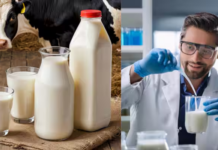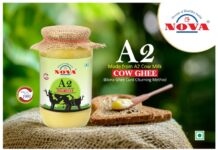New Delhi, November 11, 2023 : Mixing tea with milk is not harmful and not poisonous as claimed.
A video is going viral on social media which shows a person claiming that drinking milk tea is ‘poisonous’ for our health.
He adds that when flavonoids present in tea and casein present in milk gets mixed, they ‘form a chemical’ which is very harmful to the body.
In the video, the man making these claims is ‘Guru’ Manish, a practitioner of Ayurvedic medicine.
He also mentions that milk tea can damage your liver and kidney, turn your blood more acidic, can also result in migraine and impotence.
For a country like India, which is one of the largest consumers of tea in the world, the video was bound to go viral, and so it did. But how true are the claims made in the video? Let’s find out.
Understanding the Compounds Stated in the Video
What are flavonoids?
- According to a study published in 2013 in the USA titled ‘Tea and flavonoids: where we are, where to go next’, flavonoids are phenolic compounds which are present in several plant foods and in ‘high concentrations in tea’.
- Flavonoids include antioxidant and anti-inflammatory properties as well as the capacity to inhibit platelet aggregation.
- The study also states, “The observational evidence for flavonoid benefits on health is mixed, but relatively consistent, positive associations have been found for a decreased risk of coronary artery disease and stroke morbidity and mortality.”
- Dietary flavonoids occur naturally in fruit, vegetables, chocolate, and beverages like wine and tea.
What is casein?
- Casein is a major protein in milk. It is phosphate-conjugated and mainly consists of calcium phosphate-micelle complexes.
- According to a study published in 2016 in Iran, Health-Related Aspects of Milk Proteins, casein constitutes approximately 80% (29.5 g/L) of the total protein in bovine milk.
- Casein also helps in building muscle in the body.
So, Is Flavonoid + Casein = Poison?
Not really!
We spoke to nutritionists, Sweedal Trinidade, Chief Dietary Services, PD Hinduja Hospital and Medical Research Centre, Mumbai and Gayatri Trakru, from Ruby Hall Clinic, Pune, to learn more about this topic.
- According to Trakru, mixing milk with tea is not “poisonous”.
- She adds that it is true that tea and milk contain different compounds that can interact with each other. For example, the flavonoids in tea can bind to the casein protein in milk, reducing the absorption of both compounds.
- “However, this interaction is not harmful and does not create any poisonous substances,” she asserts.
- A study ‘Addition of whole, semiskimmed, and skimmed bovine milk reduces the total antioxidant capacity of black tea’ published in 2009 suggests that flavonoids are potent antioxidants known to bind with proteins like casein. The effect of this interaction affects the antioxidant capacity of tea. However, it didn’t raise any concerns.
- Another study conducted by the Oregon State University also states that milk consumption with tea might reduce the vascular benefits of tea as proteins (casein) bounds to flavonoids, resulting in weakening antioxidant capacity.
Sweedal Trinidade, Chief Dietary Services, PD Hinduja Hospital, Mumbai
- She concludes that mixing tea with milk is not harmful.
- Trinidade stresses that users should always check the person’s qualifications and the scientific data if he is providing any while making such claims.
A research titled ‘Dietary flavonoid intake and incidence of erectile dysfunction’ published in 2016 states that flavonoid-rich foods and drinks are associated with reduced ED incidence.
Tea is mildly acidic in nature so it is important to properly brew or store it. According to Healthline adding milk to your tea might actually help the stomach produce less acid than plain tea.
A study titled ‘METABOLISM, GENOTOXICITY, AND CARCINOGENICITY OF COMFREY’ published in 2010 revealed that only comfrey tea, which is contaminated with Pyrrolizidine Alkaloid (PA), exhibited the development of liver diseases in humans.
As per a research ‘Tea Consumption and New-Onset Acute Kidney Injury: The Effects of Milk or Sweeteners Addition and Caffeine/Coffee’ published in 2023, adding milk to the tea and drinking it in moderation resulted in significantly lower Acute Kindey Injuries.
On the other hand, research published in 2014 in China titled ‘Milk tea for preventing fatty liver and preparation method of milk tea’ stated that milk tea induced with green tea, alfalfa buds, skim milk and baked by the flavoring charcoal is capable of effectively preventing and treating the fatty liver.
Experts state that more human-based research is needed to confirm these finding as several other factors, such as diet and lifestyle, may also play a role in health conditions.
THE ‘TEA’ IS THAT DRINKING TEA IS NOT ALL BAD
In fact, several studies show that drinking tea is beneficial in keeping a healthy system.
A research titled ‘Tea and Health: Studies in Humans’ concluded that tea contains polyphenols and other components that may be responsible for reducing the risk of developing chronic diseases, including cancer, cardiovascular diseases, arthritis and diabetes.according to the reports published in dairynews7x7.com .
According to a study conducted in 2019, Journal of Tea Science Research, India is the second largest tea producer of tea. The Tea Board of India’s data indicates that 1365.23 million KG of tea was produced in 2022 in India and 1168.09 million KG of tea was consumed domestically.


































